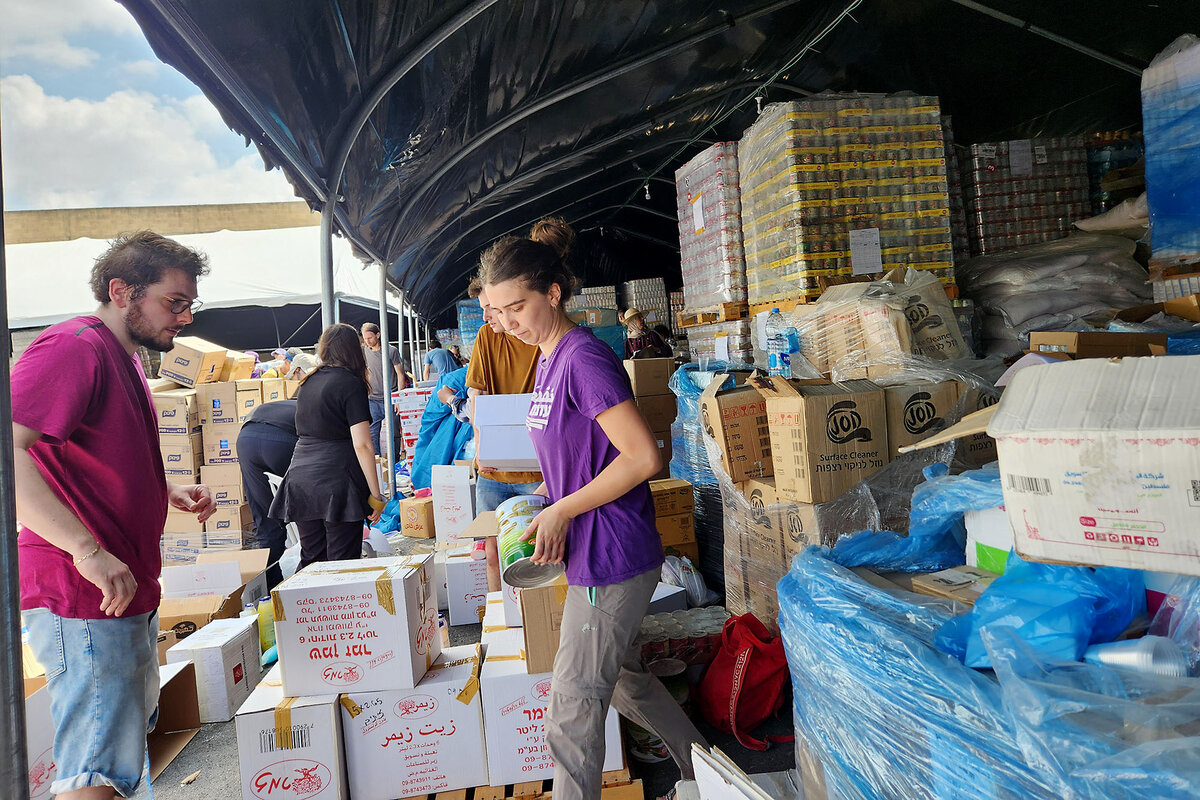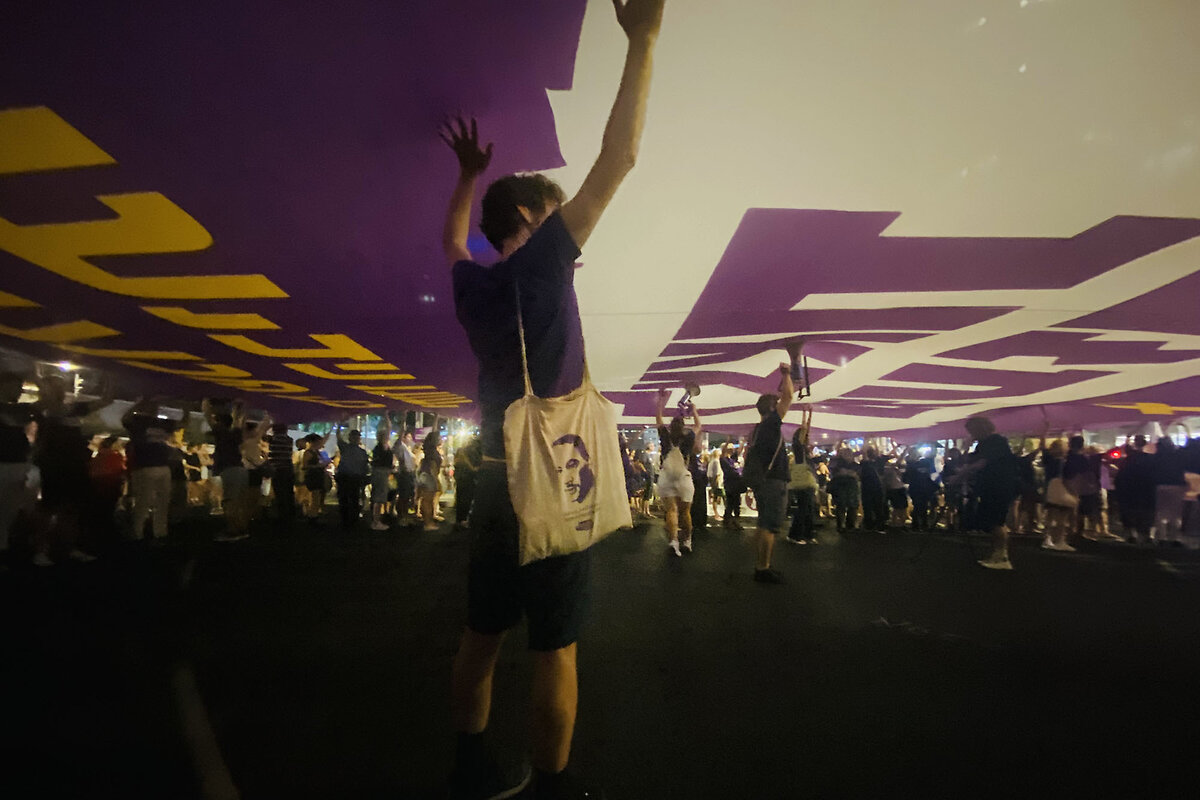What do Jewish and Palestinian Israelis have in common? Hope.
| Tel Aviv, Israel
Dusk has fallen over a major Tel Aviv intersection, now shut off to traffic and packed with protesters calling on the Israeli government to strike a deal that would free the country’s hostages from Hamas captivity.
A young woman, her dark hair fastened with a purple kerchief, rallies her comrades, struggling to make herself heard above the din of megaphone-led chants, drumming, and horns.
“Okay, now!” she shouts. “Hoist it now.”
Why We Wrote This
A story focused onA group uniting Jewish and Palestinian citizens of Israel is enjoying unexpected success with its message of a shared home. The alternative, says one founder of Standing Together, is “ongoing slaughter.”
Together, arms over their heads, they unfurl a 100-foot-long banner that reads, “So that they may all come home: Withdraw from Gaza.”
That demand is unusual among the sea of placards, chants, and signs on display at the demonstration; it acknowledges Palestinian suffering in the Gaza Strip at the hands of the Israeli military, as well as the hostages’ ordeal.
And it comes from an unusual source – a grassroots movement called Standing Together, created jointly by Jewish and Palestinian Israelis, whose members are recognizable by their purple shirts and signs.
Surprisingly, at a time when Israel is undergoing the most significant crisis in its history, the organization, founded in 2015, is enjoying a growth spurt. It is attracting record numbers of new members with its simple and direct calls for peace and its belief that Israeli-Palestinian partnership, starting within Israel, is not just aspirational, but essential.
“We are [all] losing from the current reality, and more than that, we can all win if the reality would be better for all of us. We can all win when there will be safety for everyone … when every person of this land will be equal and free,” says Alon-Lee Green, the Jewish Israeli co-director of Standing Together.
These ideas can be difficult to hold on to, he says, “at a time that is so polarizing and pushing people to extremes.”
Israel as a shared home to Jews and Palestinians?
Standing Together’s view of Israel as a shared home, where Jewish and Palestinian citizens unite in common interests, is central to its work. The group says it is trying to promote an alternative view to the narrative that Prime Minister Benjamin Netanyahu has imposed for the past three decades – that there is no solving the Israeli-Palestinian conflict, only “managing” it.
As the war in Gaza grinds on, and violence on the Lebanese border threatens to spill over into full-scale war, “we are currently in an emergency situation,” says Rula Daood, the Palestinian Israeli co-director of Standing Together. “Thousands of citizens, Jewish and Arabs, are in shelters and don’t know what will happen next.”
Until the brutal Hamas assault on Israel on Oct. 7, Standing Together concerned itself with social and economic justice issues such as affordable housing and protesting against Israel’s occupation of the West Bank. Since the war began, it has pivoted its mission to fighting for what can feel like a radical notion these days: peace itself.
That fight can take different forms.
The group attracted overflow crowds to its Jewish-Arab solidarity conventions in the weeks after Oct.7. Its smaller, more intimate dialogue-style gatherings are popular, and some members have won seats on municipal councils.
But the action can also get more robust. Earlier this year, when far-right activists disrupted an aid convoy headed to Gaza, tossing food off the trucks and setting fire to two vehicles, Standing Together activists confronted them. Forming what they called a “humanitarian guard,” they protected subsequent convoys, ensuring their aid was delivered.
In August, the organization arranged for a truck to drive among Arab towns in Israel to collect aid supplies for delivery to Gaza. The volunteer response, most of it from Palestinian Israelis relieved to be able to help Gazan civilians, was overwhelming. Thousands of people donated goods, and ultimately some 400 truckloads of supplies were collected.
“People felt secure to come to one point, not just to donate food and hygienic stuff, but also to take part, to be part of what was happening, to feel that they have something that they can contribute,” says Ms. Daood.
Among the Jewish Standing Together activists who joined them was Haviva Ner-David, who lives in the Galilee and whose chapter has doubled to 700 members in the past year. What made the Gaza aid drive more moving, she says, “was that we were doing this together — Palestinian and Jewish Israelis of all ages, including children, the elderly, and the physically challenged, even amid a war between our nations.”
A fresh perspective, or ‘ongoing slaughter’
Ms. Daood says it was during a Standing Together march in Tel Aviv in 2017, filled with the unusual sound of both Hebrew and Arabic chants against racism, that she first felt the pull and the power of a shared voice.
“That moment felt so huge for me; it made me realize that partnership is something that you can just do,” she says.
That kind of partnership also offers a fresh perspective, suggests Dani Filc, a professor of politics and government at Ben-Gurion University who helped found Standing Together.
“We are always conscious of not taking a moralist stand,” he says. “We are opposing the war in the interests of all Israelis, both Jewish and Palestinians, not playing a blame game.”
“One of the main slogans of the movement is ‘Where there is struggle, there is hope,’” Professor Filc points out. “And we struggle because we did not lose hope. Hope is mandatory, because the alternative is ongoing slaughter.”











